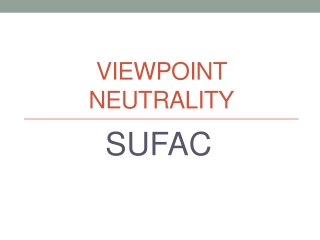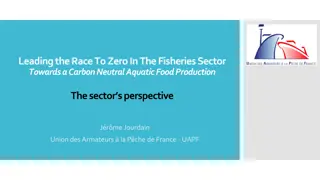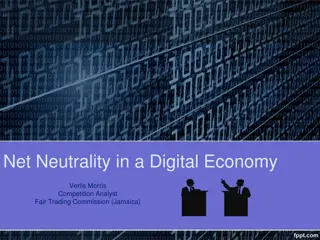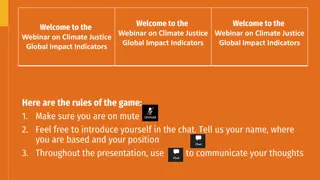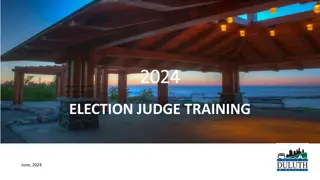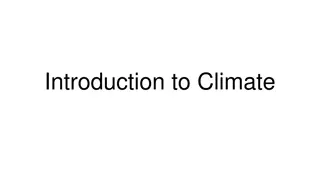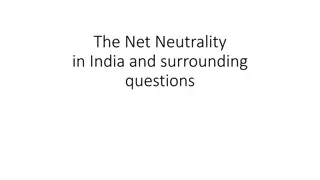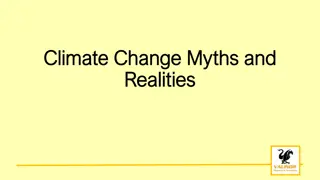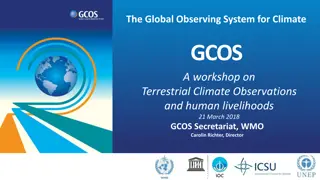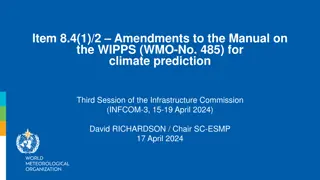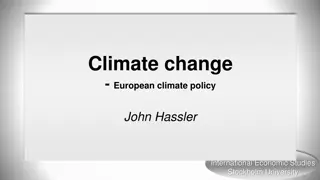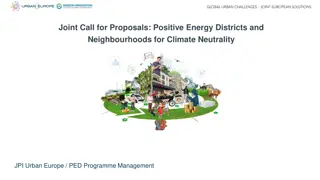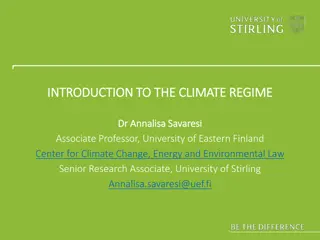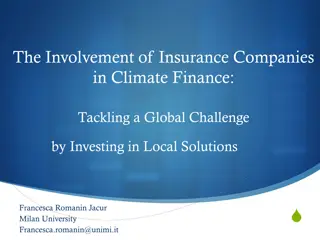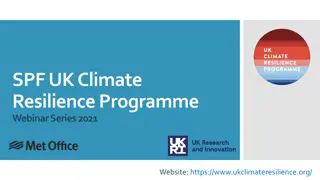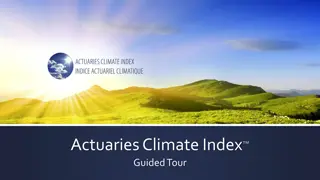Improving Health Amid Climate Change Challenges
Climate change has significant impact on health, requiring global sectors to act. Explore initiatives of the Ministry of Health in addressing climate-related health threats. Understand the interplay between climate change and health systems for a sustainable future. Learn the adverse effects of clim
4 views • 10 slides
An overview of solar influence on climate
The relationship between solar variability and Earth's climate is complex, with factors like the Sun's energy output, 11-year solar cycle, and regional differences playing a role. This overview delves into how solar influences interact with atmospheric and oceanic processes, such as the Sun's impact
6 views • 37 slides
Understanding Viewpoint Neutrality in Student Fee Allocations
Explore the concept of viewpoint neutrality in student fee allocations, focusing on the U.S. Supreme Court's decision in Southworth v. Board of Regents. Learn about the constitutional mandate for public institutions to remain neutral in funding decisions and the history behind the Southworth case. D
3 views • 32 slides
Understanding Climate Change: Weather vs. Climate, Kppen-Geiger Classification, and Major Climate Zones
Explore the distinctions between weather and climate, delve into the Kppen-Geiger Climate Classification System, and discover major climate categories such as tropical climates. Gain insights into climate change and its impact on our environment.
8 views • 11 slides
Understanding Climate Neutrality and Roadmaps for Achieving it at a University
Exploring the concept of climate neutrality and the development of roadmaps to achieve it at a university, focusing on the efforts of JKU and its Energy Institute towards CO2 reduction and reaching climate neutrality by 2030. The roadmap involves stakeholder engagement, defining system boundaries, u
1 views • 19 slides
EU Global Leadership in Climate Policy - Assessment and Analysis
The European Union (EU) has been at the forefront of international climate change leadership for decades, navigating challenges and actively engaging in various climate agreements. This comprehensive assessment delves into the framework, analysis, and appraisal of EU climate leadership, highlighting
3 views • 24 slides
National Climate Change Bill Overview
The National Climate Change Bill aims to establish an effective response to climate change in South Africa, promoting a transition to a low-carbon, climate-resilient economy. It focuses on coordinated actions, adaptive capacity enhancement, greenhouse gas management, and a fair global contribution.
8 views • 21 slides
Ireland's Neutrality in World War II
Despite being divided into North and South, with Northern Ireland part of the UK, the Free State of Ireland remained neutral during World War II. Eamon DeValera, leader of Fianna Fail, chose neutrality, which impacted Ireland's relationship with both the Allies and the Axis powers. Learn more about
6 views • 9 slides
Regional Climate Modeling in CORDEX South Asia for Climate Change Research
This information details the regional climate modeling efforts within the CORDEX South Asia framework, focusing on high-resolution dynamical downscaling of CMIP5 climate projections. It highlights the activities, opportunities, and challenges for assessing regional climate change, along with future
4 views • 11 slides
Investment Responses to Biophysical Climate Impacts on Water, Energy, and Land in SDGs and Climate Policies
Investment assessments using Integrated Assessment Models (IAMs) are evolving to include biophysical climate impacts, assessing climate uncertainty on investments. The approach involves the MESSAGEix-GLOBIOM IAM, considering climate policy, SDG measures, and impacts under different scenarios. Climat
6 views • 32 slides
Gender-based Climate Change Litigation: A Key Solution?
Gender-based climate change litigation is emerging as a potential solution to address the disproportionate impact of climate change on different genders. Various international bodies have recognized the importance of integrating a gender-responsive approach in climate action to uphold human rights,
4 views • 12 slides
Gender and Climate Change in Agriculture: Impacts and Adaptation Strategies
This workshop explores the intersection of gender and climate change in agriculture, emphasizing the importance of considering gender dynamics in adaptation planning. It covers the effects of climate change on men and women in agriculture, reasons for gender-sensitive adaptation planning, global and
0 views • 10 slides
Enhancing Land Degradation Neutrality Targets in Lebanon's National Action Programme
Integrating LDN targets into Lebanon's National Action Programme, led by Dr. Chadi Mohanna, aims to align the NAP with the UNCCD's 10-Year Strategy, set national targets for Land Degradation Neutrality, and implement measures to combat land degradation aggravated by climate change. The project focus
0 views • 23 slides
Regional Project Proposal to Enhance Climate Resilience in Pakistan, Mongolia, and PRC
This proposal outlines a regional project focusing on enhancing climate resilience and agricultural productivity in Pakistan, Mongolia, and the People's Republic of China (PRC). The project aims to increase access to credit for smallholder farmers, promote climate-smart agriculture technologies, and
0 views • 12 slides
Maintaining Neutrality as a Facilitator in Collaborative Meetings
When a facilitator maintains neutrality in collaborative meetings, it allows all voices to be heard, encourages collective intelligence, and fosters fairness and inclusivity. Developing neutrality involves self-reflection, seeking diverse perspectives, questioning assumptions, and practicing empathy
0 views • 16 slides
Advancing Towards Carbon Neutrality in the EU Fisheries Sector
The EU fisheries sector is making strides towards carbon neutrality, with a focus on reducing greenhouse gas emissions and adopting energy-efficient technologies. Efforts include decreasing CO2 emissions from fishing fleets, implementing regulations for vessel capacity, and exploring innovative equi
0 views • 13 slides
Personal Rights in European Climate Litigation
Climate litigation in Europe focuses on individual rights and the shortcomings of traditional governance mechanisms in addressing climate change. The emergence of climate litigation as a crucial tool in governance is driven by the need to protect individuals and specific groups who are disproportion
0 views • 17 slides
Understanding Net Neutrality in a Digital Economy: A Comprehensive Analysis
Explore the concept of net neutrality in the digital economy through an in-depth analysis of how ISPs discriminate, the Jamaican example, arguments for and against, and key issues surrounding online equality and regulation.
0 views • 14 slides
Analyzing Systemic Climate Risk in the Financial Sector
This study discusses systemic climate risk in the financial sector by examining the effects of climate risks on financial institutions. It aims to design a market-based framework to assess the vulnerability of financial institutions to climate risks and analyze potential contagion effects. The frame
0 views • 39 slides
Climate Justice Global Impact Indicators Webinar - June 2023
Explore the Climate Justice Theory of Change, key definitions, impact indicators, and the importance of climate-relevant decision-making in this informative webinar. Gain insights on climate adaptation, resilience, and the effects of climate change, all aimed at empowering marginalized communities t
0 views • 27 slides
2024 Election Judge Training: Code of Conduct, Neutrality, and Polling Place Setup
Explore the essentials of election judge training for the 2024 elections, covering the code of conduct, maintaining neutrality in the polling place, and details on polling place setup and roles. Understand the oath, duties, and responsibilities of an election judge, emphasizing impartiality, profess
0 views • 55 slides
Understanding Net Neutrality: Perspectives and Debates
Net Neutrality is the principle that Internet Service Providers (ISPs) should treat all Internet communications equally, without discrimination based on user, content, or source. Various actors hold different perspectives on this principle, with arguments for and against its implementation. Proponen
0 views • 17 slides
National Priorities for Climate Change Science and Knowledge in Canada
Canadians are experiencing firsthand the impacts of climate change, including wildfires, heatwaves, floods, hurricanes, and droughts. To address these challenges, foundational climate change science and knowledge are essential for understanding our changing environment, identifying impacts, making i
0 views • 9 slides
Understanding Climate and Its Impact on Earth
Exploring the fundamentals of climate, this comprehensive guide covers topics such as climate zones, climate formation, atmospheric composition, the role of CO2, ocean heat absorption, and circulation patterns. From the basics of weather and seasons to the significant impact of climate change, learn
0 views • 12 slides
Understanding Net Neutrality in India: Key Concepts and Regulations
Net neutrality in India ensures equal access to online content without discrimination. Telecom Service Providers are regulated to prevent differential tariffs for data services. Different stakeholders like consumers, TSPs, OTT service providers, and the government play crucial roles. Net neutrality
0 views • 10 slides
The Teacher-Friendly Guide to Climate Change
The Teacher-Friendly Guide to Climate Change authored by Ingrid Zabel, Don Duggan-Haas, Robert Ross, and others explores topics such as climate measurement, natural causes of climate change, historical climate perspectives, and more. It delves into the significance of understanding past climates to
1 views • 12 slides
Climate Change Myths and Realities: Debunking Common Misconceptions
This content discusses common myths surrounding climate change and provides evidence-backed realities to debunk them. Topics include the pause in warming, natural climate variability, misconceptions about climate models, the impact of CO2 on plant life, and the consensus among climate scientists. Th
0 views • 6 slides
The Global Observing System for Climate and Terrestrial Climate Observations
The Global Observing System for Climate (GCOS) plays a crucial role in observing climate-related variables globally. Established in April 1992, GCOS focuses on what, how, and where to measure, sustain measurement, manage change, data transmission, management, rescue, and access. It addresses concern
0 views • 17 slides
Amendments to WIPPS Manual for Climate Prediction at INFCOM-3, April 2024
The document discusses amendments to the Manual on WIPPS for climate prediction, including new recommendations for weather, climate, water, and environmental prediction activities. It introduces concepts such as Global Climate Reanalysis and the coordination of multi-model ensembles for sub-seasonal
0 views • 10 slides
Understand PAS 2060:2014 - Specification for Carbon Neutrality
Explore PAS 2060:2014, a standard for demonstrating carbon neutrality through emission offsetting and reduction. Learn about carbon neutrality, offsetting, benefits of the standard, and the significance of a Carbon Reduction Plan in making a positive environmental impact.
0 views • 8 slides
European Climate Policy and Transition to Climate Neutrality
European climate policy focus on sharp emission limits, socially acceptable transition measures, and global involvement for a successful transition to climate neutrality. Key elements include ETS, emission allowances, and Fit for 55 proposal to achieve climate neutrality by 2050.
0 views • 19 slides
Climate Change Litigation in Aotearoa/New Zealand: LCANZI Action and Judicial Review
The Lawyers for Climate Action NZ Incorporated (LCANZI) are actively involved in climate change litigation in Aotearoa/New Zealand, including challenging government decisions related to climate responses. A notable case involved a judicial review against Auckland Transport, where the High Court refu
0 views • 6 slides
Joint Call for Proposals - Positive Energy Districts and Neighbourhoods for Climate Neutrality
This joint call for proposals, facilitated by JPI Urban Europe, focuses on developing Positive Energy Districts and Neighbourhoods to address climate neutrality goals. The initiative aims to enhance knowledge and support large-scale implementation by 2025, aligning with Horizon Europe's mission for
0 views • 14 slides
Understanding Weather and Climate Factors
Weather and climate are essential aspects of understanding the Earth's atmosphere. Weather refers to short-term atmospheric conditions, while climate represents long-term averages over 30 years. Factors influencing climate include distance from the equator, altitude, proximity to the sea, wind direc
0 views • 10 slides
Understanding the International Climate Regime and Governance
In this comprehensive overview, Dr. Annalisa Savaresi delves into the intricacies of the international climate regime, highlighting key aspects such as international climate law, major climate conferences like COP26, and the evolution of climate governance. The discussion covers important agreements
0 views • 27 slides
The Role of Insurance Companies in Climate Finance: Addressing Global Challenges through Local Investments
Exploring the engagement of insurance companies in climate finance, this presentation highlights the significance of private sector involvement in tackling climate change at a local level. It delves into key concepts such as mitigation, adaptation, and the global scientific targets for combating cli
0 views • 11 slides
UK Climate Resilience Programme Webinar Series 2021
The UK Climate Resilience Programme is hosting a webinar series featuring experts discussing climate resilience, adaptation strategies, and socio-economic pathways for the UK. Attendees can engage in presentations, Q&A sessions, and access recorded content post-event. Learn about the latest developm
0 views • 10 slides
Government Advertising Guidelines and Public Service Neutrality
Government Advertising Guidelines and the concept of political neutrality in public service are essential for maintaining transparency, accountability, and public trust. Te Kawa Mataaho and Cabinet Office play pivotal roles in ensuring government communication aligns with the public interest. Unders
0 views • 15 slides
Understanding the Actuaries Climate Index: A Comprehensive Guide
The Actuaries Climate Index (ACI) is an essential tool that measures climate risks using historical data collected since 1961. It focuses on extreme climate events and sea level changes, providing valuable insights into the impacts of climate change. By analyzing the ACI and its components, users ca
0 views • 18 slides
Canadian Climate Change Policy from a Climate Ethics Perspective
Explore the ethical implications of Canadian climate change policy, delving into the necessity of meeting targets established in the Paris Agreement, the need for rapid decarbonization, and the availability of climate-safe energy alternatives. The presentation emphasizes the urgency of action to mit
0 views • 16 slides


